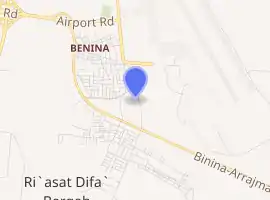Martyrs of February Stadium
Benina Martyrs Stadium (Arabic: ملعب شهداء بنينة) and until 2011 officially named Hugo Chávez Football Stadium (Arabic: ملعب هوغو شافيز), is a Libyan football stadium located in Benina, a town 19 km east of Benghazi. The stadium was constructed by the same company that built the Brita-Arena in Germany. The stadium holds 10,550 people.[2] This is Libya's first all-seater stadium. The stadium will be used by most Benghazi clubs, and may be used by the national team as well. The surface of the pitch is artificial. The pitch's dimensions are 105m x 68m.[2] The cost of construction of the stadium was around LYD 20 million.[2]

| |
| Location | Benina (east of Benghazi), Libya |
|---|---|
| Coordinates | 32°4′48″N 20°15′42″E |
| Owner | Libyan Football Federation |
| Operator | Benghazi clubs |
| Capacity | 10,550[1] |
| Field size | 68 metres (74 yd) by 105 metres (115 yd)[1] |
| Surface | Artificial |
| Construction | |
| Built | February 2008-March 2009 |
| Opened | 5 March 2009 |
| Tenants | |
| Al Ahly Benghazi, Al Hilal, Al Nasr[1] | |
History
The stadium was originally named after Venezuelan President Hugo Chávez,[3][4] due to Libyan leader Muammar Gaddafi's close friendship with him.[4][5] However, following the Libyan Civil War, it was announced that the stadium had been renamed in honour of the so-called Martyrs of February, the people who were killed in fighting to gain control over Eastern Libya.[6]
The stadium was opened on 5 March 2009, as the Libya U-23 team played the Syria U-23 in a friendly. A capacity crowd watched the match finish 2-1 to the Syrians, with Libya and Al Ahly Benghazi's Ihab Ghafir becoming the first player to score at the stadium, in the 28th minute.
The first goal to be scored at the new stadium in a competitive match was scored by Al Hilal's Alaa al Oujli in the 26th minute of their league match with Al Jazeera. The match ended 2-2.
On 8 March 2011, the National Transitional Council renamed the stadium Martyrs of February, in honor of those who died during the Libyan civil war. The new name has been spray-painted in red, with the expectation that new signs will soon be installed.[7]
The stadium was a confirmed venue for the 2017 Africa Cup of Nations before Libya's role as host of the tournament was cancelled in August 2014.
References
- Benina Stadium at goalzz.com
- Information about Benina Stadium at kooora.com (in Arabic)
- Name of Benina Stadium revealed (in Arabic) kooora.com
- Libya honours Chavez with stadium BBC News, 6 March 2009
- New stadium in Benina named after Venezuelan president Archived 2009-03-04 at the Wayback Machine (in Arabic) 1 March 2009 Al Watan-Libya.com
- Venezuela's Hugo Chavez loses Libya stadium honour - BBC News, 8 March 2011
- http://eluniversal.com/2011/03/08/hugo-chavez-se-queda-sin-estadio-en-libia.shtml Hugo Chavez se queda sin estadio en Libia